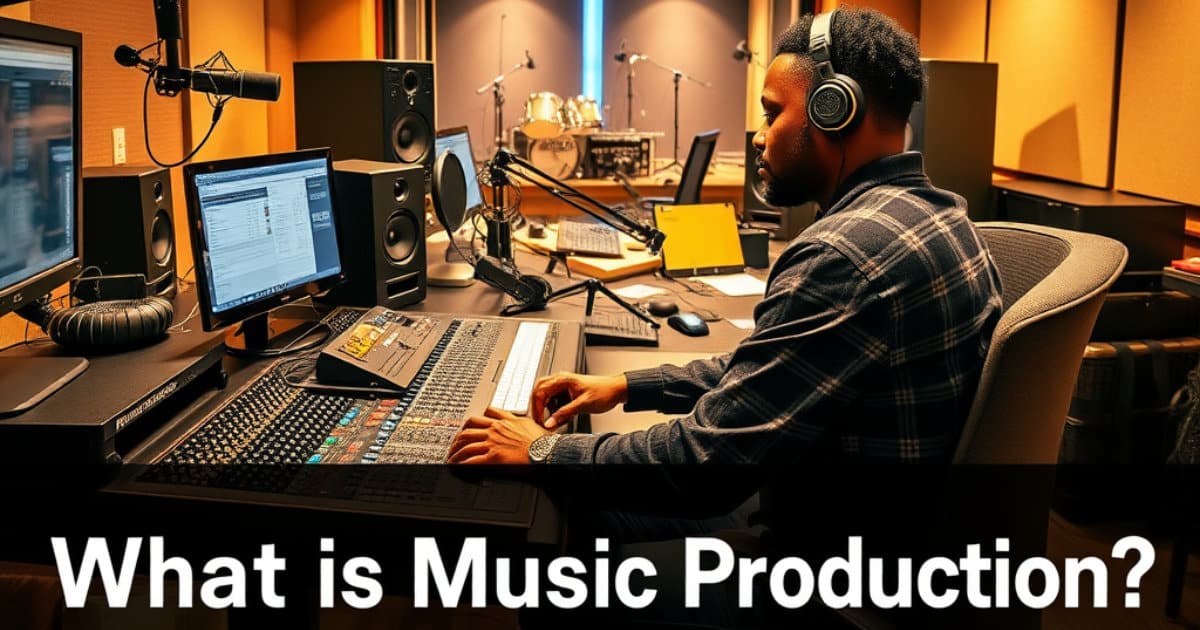Estimated reading time: 11 minutes
Have you ever listened to a song and wondered, “How did they create that incredible sound?” Or perhaps you’ve dreamed of making your own music but felt overwhelmed by the process. Welcome to the fascinating world of music production – the art and science behind every track you hear on the radio, streaming platforms, or in your favorite films.
Music production is the heartbeat of the music industry, but it often remains a mystery to many. From crafting melodies to mixing tracks, it’s a complex journey that transforms raw ideas into polished masterpieces. Whether you’re an aspiring artist, a curious listener, or someone considering a career in the music industry, understanding music production can open up a whole new dimension of appreciation for the songs you love.
In this blog post, we’ll demystify the process of music production, exploring everything from the role of a music producer to the equipment they use. We’ll dive into how music is actually produced, discuss the potential earnings in this field, and even guide you on how to start your journey as a music producer. So, tune in and get ready to discover the magic behind the music!
Table of contents
What is a Music Producer?
The Role of a Music Producer
A music producer is the creative and technical mastermind behind the production of a musical recording. They are responsible for overseeing and managing the entire music production process, from conceptualization to the final product. Music producers wear many hats and possess a unique blend of artistic vision, technical expertise, and interpersonal skills.
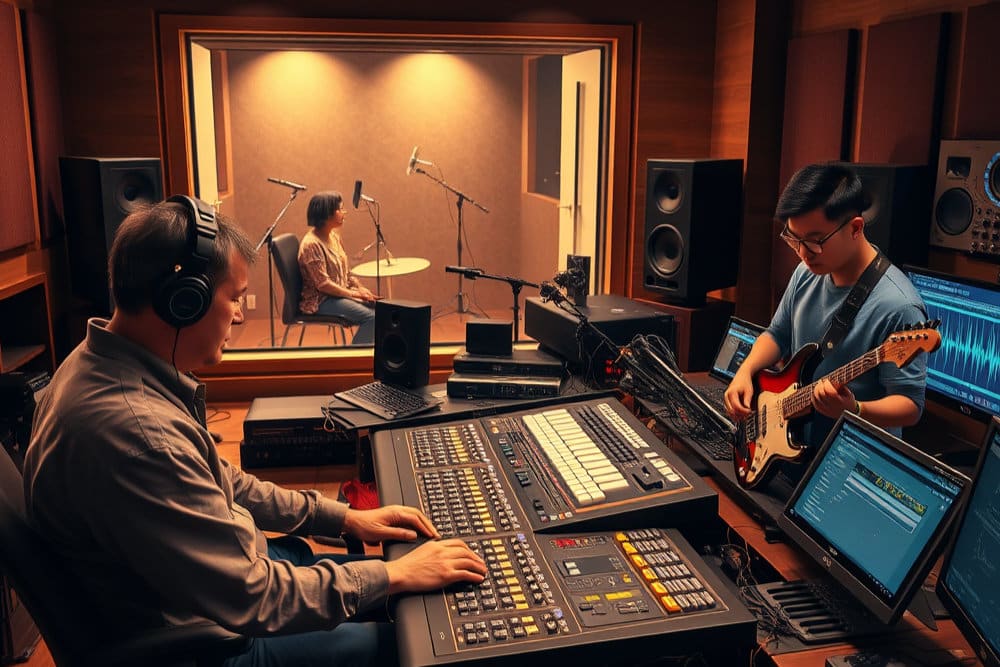
Key Responsibilities
- Creative Direction
- Sound Engineering
- Talent Management
- Project Management
- Business Acumen
Here’s a breakdown of these responsibilities:
| Responsibility | Description |
|---|---|
| Creative Direction | Shaping the overall sound and vision of a music project |
| Sound Engineering | Overseeing recording, mixing, and mastering processes |
| Talent Management | Working with artists to bring out their best performances |
| Project Management | Coordinating schedules, budgets, and resources |
| Business Acumen | Understanding industry trends and market demands |
Skills and Qualities
A successful music producer typically possesses:
- Excellent ear for music and sound quality
- Proficiency in various music production software and equipment
- Strong communication and leadership skills
- Ability to work under pressure and meet deadlines
- Adaptability to different musical genres and styles
Music producers are the unsung heroes of the music industry, blending artistry with technical expertise to create the soundtracks of our lives. Their role is crucial in shaping the music we hear and love, making them an integral part of the music production process.
What Does a Music Producer Do?
A. Schedule and Budget
A music producer’s role begins with meticulous planning. They create a detailed schedule for the entire production process, from initial songwriting sessions to final mastering. This timeline ensures efficient use of studio time and keeps the project on track. Simultaneously, producers manage the budget, allocating resources for equipment, studio time, and personnel.
| Task | Typical Time Allocation | Budget Consideration |
|---|---|---|
| Pre-production | 1-2 weeks | 10-15% of total budget |
| Recording | 2-4 weeks | 40-50% of total budget |
| Mixing | 1-2 weeks | 20-25% of total budget |
| Mastering | 2-3 days | 5-10% of total budget |
B. Shaping the Music
At the heart of music production is the art of shaping the sound. Producers work closely with artists to:
- Refine song structures
- Suggest instrumentation changes
- Enhance arrangements
- Guide vocal performances
They use their expertise in music production software and audio engineering basics to craft the desired sound, often employing techniques like:
- Layering tracks
- Applying effects
- Adjusting EQ and dynamics
- Creating unique sonic textures
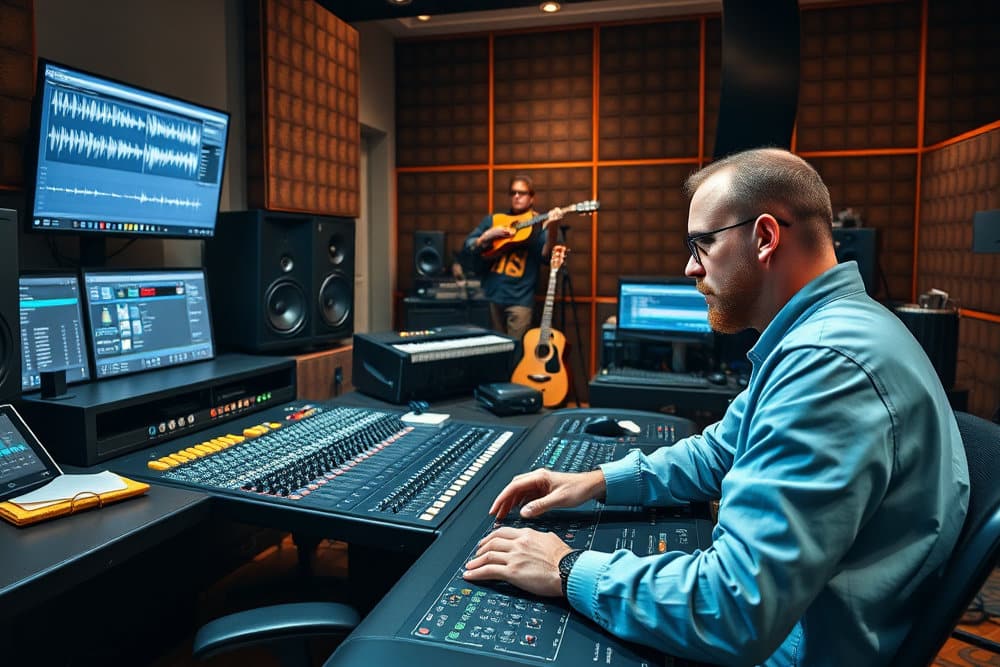
C. Supervising Performance
During recording sessions, the producer takes on the role of a coach and supervisor. They:
- Direct musicians and vocalists
- Ensure high-quality performances
- Make real-time decisions on takes
- Maintain a positive and creative studio atmosphere
D. ‘Work vs. Play’
Balancing the technical aspects of production with creativity is crucial. Producers must:
- Maintain focus on project goals
- Foster an environment that encourages artistic expression
- Manage time effectively between technical tasks and creative exploration
This delicate balance ensures that the production process remains both productive and inspiring, ultimately leading to a polished final product that meets artistic vision and commercial standards.
How is music produced?
Musical Ideas
Music production begins with the creation of musical ideas. This stage involves songwriting, composing melodies, and developing harmonies. Producers often collaborate with artists to refine concepts and ensure they align with the project’s vision.
- Brainstorming sessions
- Instrument experimentation
- Lyric writing
- Chord progression development
Recording
Once the musical ideas are solidified, the recording process begins. This crucial step captures the raw audio elements that will form the foundation of the track.
| Recording Methods | Pros | Cons |
|---|---|---|
| Live Recording | Authentic feel, captures energy | Potential for mistakes |
| Multi-tracking | Precise control, flexibility | Can lack spontaneity |
| MIDI Recording | Easy to edit, versatile | May sound artificial |
Editing
After recording, producers focus on editing the raw material. This stage involves:
- Cleaning up audio tracks
- Adjusting timing and pitch
- Selecting the best takes
- Arranging song structure
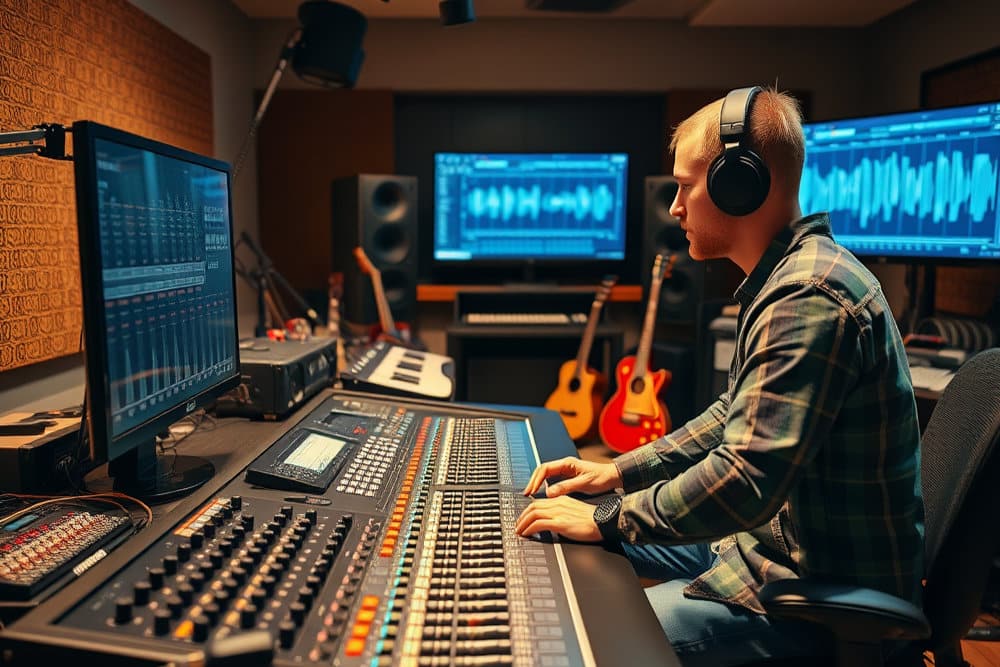
Mixing
Mixing is where the separate elements come together cohesively. Producers balance levels, apply effects, and create a stereo image to enhance the overall sound.
Mastering
The final step in music production is mastering, which prepares the track for distribution. This process involves:
- Equalizing the overall mix
- Applying compression for consistency
- Adjusting stereo balance
- Setting appropriate volume levels
With mastering complete, the track is ready for release, concluding the music production process. Each stage builds upon the previous, transforming raw musical ideas into a polished, professional product.
How Much Money Does a Music Producer Make?
Salary Range for Music Producers
Music producer salaries can vary widely based on experience, location, and industry sector. Here’s a breakdown of potential earnings:
| Experience Level | Annual Salary Range |
|---|---|
| Entry-level | $25,000 – $35,000 |
| Mid-level | $50,000 – $100,000 |
| Experienced | $100,000 – $300,000+ |
Top-tier producers in major music hubs like Los Angeles or New York can earn significantly more, sometimes reaching seven-figure incomes for high-profile projects.
Factors Affecting Music Producer Salaries
Several factors influence a music producer’s earning potential:
- Industry reputation
- Track record of successful projects
- Specialization (e.g., pop, hip-hop, film scoring)
- Networking abilities
- Business acumen
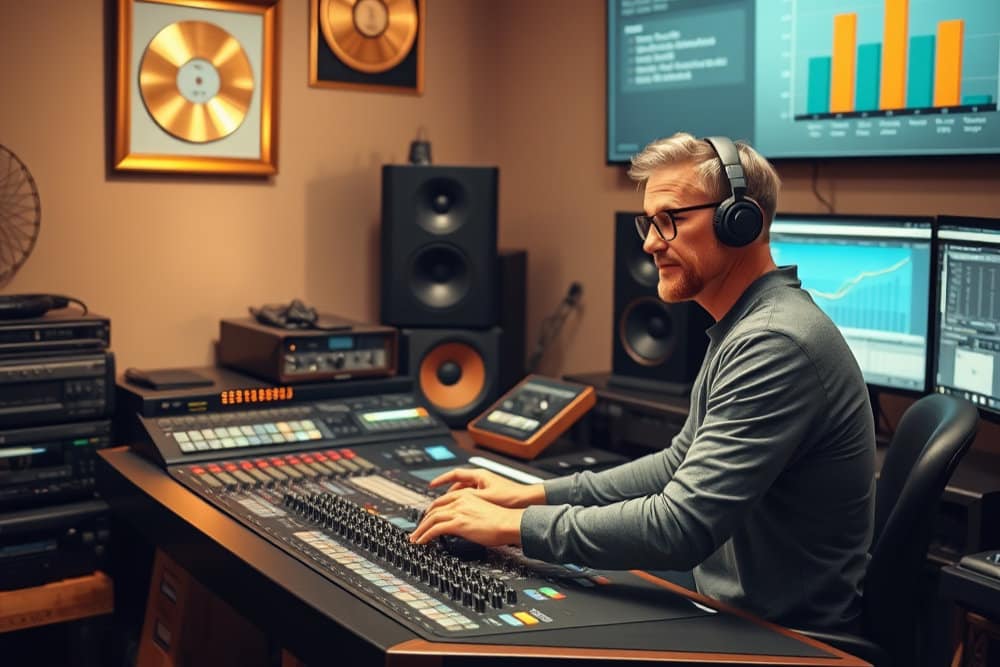
Additional Income Streams
Music producers often supplement their income through:
- Royalties from successful tracks
- Songwriting credits
- Studio equipment rentals
- Teaching or mentoring aspiring producers
With the music production landscape constantly evolving, producers who stay current with industry trends and technology can command higher rates. As we explore the essential equipment for music production in the next section, you’ll gain insight into the tools that can help elevate a producer’s craft and, consequently, their earning potential.
Music Production Equipment
Essential Music Production Equipment
To create professional-quality music, producers rely on a range of specialized equipment. Here’s a breakdown of the essential tools:
Digital Audio Workstation (DAW)
A DAW is the heart of modern music production. It’s software that allows you to record, edit, and mix audio on your computer. Popular options include:
- Pro Tools
- Logic Pro
- Ableton Live
- FL Studio
Audio Interface
An audio interface connects your instruments and microphones to your computer. It converts analog signals to digital data that your DAW can process.
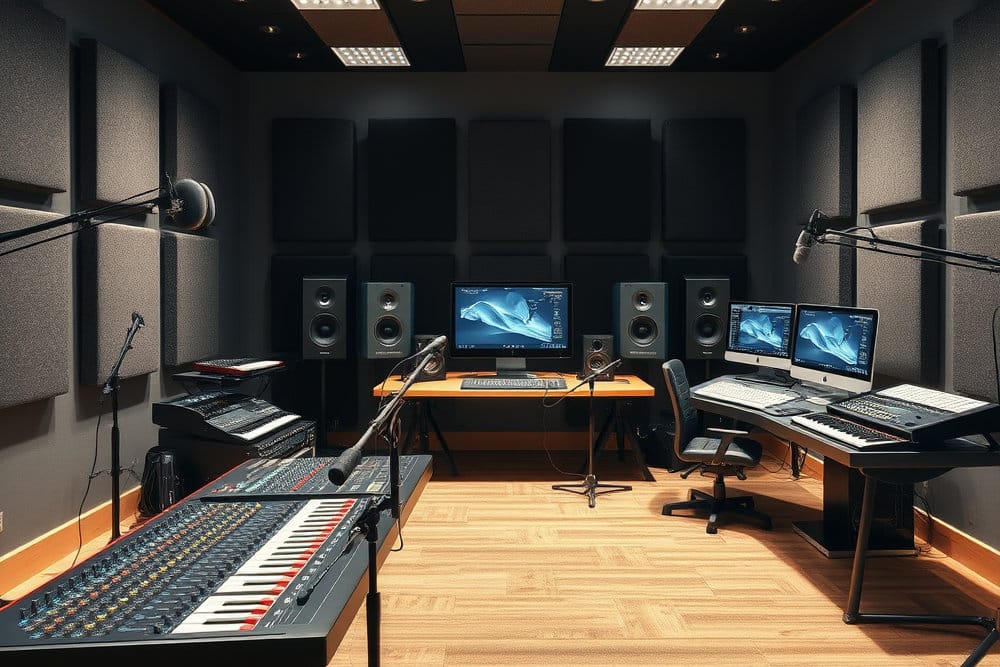
Microphones
Different microphones serve various purposes in music production:
- Condenser mics: Ideal for vocals and acoustic instruments
- Dynamic mics: Great for drums and loud sources
- Ribbon mics: Offer a warm, vintage sound
Studio Monitors
High-quality speakers designed for accurate sound reproduction are crucial for mixing and mastering.
MIDI Controller
A MIDI controller, often in the form of a keyboard, allows you to input musical data into your DAW and control virtual instruments.
Headphones
Two types of headphones are essential:
- Closed-back: For recording
- Open-back: For mixing and critical listening
Here’s a comparison of basic and advanced studio setups:
| Equipment | Basic Setup | Advanced Setup |
|---|---|---|
| Computer | Laptop | High-performance desktop |
| DAW | Free or entry-level | Professional-grade |
| Audio Interface | 2-channel | Multi-channel |
| Microphones | 1-2 versatile mics | Multiple specialized mics |
| Monitors | Entry-level pair | High-end pair + subwoofer |
| MIDI Controller | 25-key | 88-key weighted |
| Headphones | One multi-purpose pair | Separate pairs for recording and mixing |
With this equipment, you’ll be well-prepared to start your journey in music production. Next, we’ll explore the steps to becoming a music producer and building a successful career in this dynamic field.
How Do You Become a Music Producer?
Learn the Basics of Music Theory
To become a music producer, start by mastering the fundamentals of music theory. This includes understanding:
- Scales and chords
- Rhythm and time signatures
- Melody and harmony
- Song structure
Developing a strong foundation in music theory will help you communicate effectively with musicians and make informed decisions during the production process.
Gain Proficiency in Music Production Software
Familiarize yourself with industry-standard Digital Audio Workstations (DAWs) such as:
| Software | Key Features |
|---|---|
| Pro Tools | Industry standard, powerful editing |
| Logic Pro | Mac-exclusive, extensive virtual instruments |
| Ableton Live | Ideal for electronic music, live performances |
| FL Studio | User-friendly interface, pattern-based sequencing |
Choose one or two DAWs to master, as each has unique strengths for different genres and workflows.
Set Up a Home Studio
Create a basic home studio to practice and develop your skills:
- Invest in quality studio monitors
- Purchase a MIDI keyboard controller
- Acquire a reliable audio interface
- Set up proper acoustic treatment in your workspace
As you progress, gradually upgrade your equipment to improve your production capabilities.
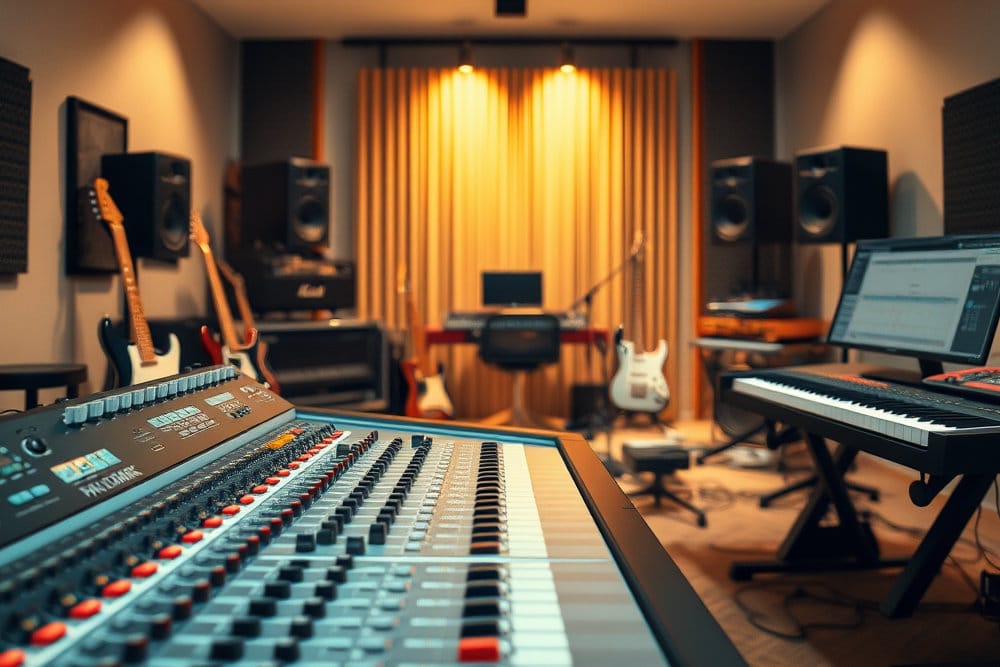
Develop Your Ear and Critical Listening Skills
Train your ear to identify:
- Frequency ranges
- Stereo imaging
- Dynamic range
- Effects and processing techniques
Practice active listening by analyzing professionally produced tracks in various genres.
With these foundational steps, you’ll be well on your way to becoming a skilled music producer. Remember that continuous learning and practice are key to success in this dynamic field.
Music production is a multifaceted art form that encompasses the creation, recording, and refinement of musical compositions. From understanding the role of a music producer to learning about the essential equipment and techniques, this blog post has explored the various aspects of music production.
As we’ve discovered, becoming a successful music producer requires a combination of technical skills, creativity, and industry knowledge. Whether you’re an aspiring producer or simply curious about the process, it’s clear that music production offers a rewarding career path for those passionate about shaping the sounds we hear. By investing in quality equipment, honing your skills, and staying up-to-date with industry trends, you can embark on an exciting journey in the world of music production.
Video: What does a Music Producer ACTUALLY Do?
Conclusion
In conclusion, music production is more than just an occupation—it’s a dynamic blend of art and technology that brings ideas to life and shapes the soundtracks of our lives. Whether you’re inspired to create your own music or simply want to deepen your appreciation for the craft, understanding the intricacies of music production opens a window into the incredible effort and creativity behind every song.
With dedication, the right tools, and a passion for sound, anyone can explore this vibrant field and contribute to the universal language of music. So, take the first step, and let the rhythm guide you!
Related Posts
FAQs
Music production is the process of creating, recording, and refining music. It involves shaping raw musical ideas into polished tracks through steps like songwriting, recording, editing, mixing, and mastering. Producers oversee this process, combining creativity and technical expertise to bring songs to life.
A music producer manages every stage of music creation, from conceptualizing the sound to finalizing the track. They guide artists, oversee recording sessions, refine performances, and mix and master songs, ensuring the final product aligns with artistic vision and industry standards.
Key equipment includes a digital audio workstation (DAW), audio interface, microphones, studio monitors, MIDI controllers, and headphones. These tools enable recording, editing, and mixing music, helping producers create professional-quality tracks in a home or professional studio.
Music producer salaries vary based on experience, location, and reputation. Entry-level producers earn around $25,000–$35,000 annually, while experienced professionals can earn $100,000 or more. Additional income streams like royalties and songwriting credits can significantly boost earnings.
Start by learning music theory, mastering a DAW, and setting up a basic home studio. Practice creating and editing tracks, develop critical listening skills, and network within the industry. Continuously improve your skills and stay updated on music production trends to grow your career.
